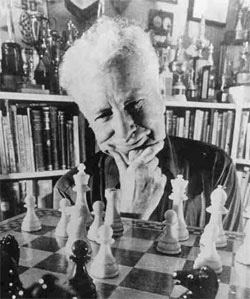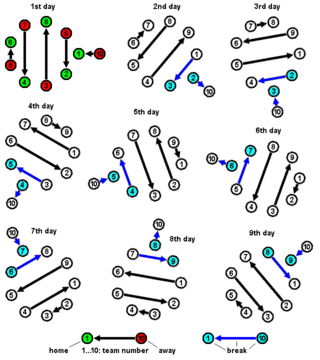Related Research Articles

The rules of chess govern the play of the game of chess. Chess is a two-player abstract strategy board game. Each player controls sixteen pieces of six types on a chessboard. Each type of piece moves in a distinct way. The object of the game is to checkmate the opponent's king; checkmate occurs when a king is threatened with capture and has no escape. A game can end in various ways besides checkmate: a player can resign, and there are several ways a game can end in a draw.

The Elo rating system is a method for calculating the relative skill levels of players in zero-sum games such as chess. It is named after its creator Arpad Elo, a Hungarian-American physics professor.
This glossary of chess explains commonly used terms in chess, in alphabetical order. Some of these terms have their own pages, like fork and pin. For a list of unorthodox chess pieces, see Fairy chess piece; for a list of terms specific to chess problems, see Glossary of chess problems; for a list of named opening lines, see List of chess openings; for a list of chess-related games, see List of chess variants; for a list of terms general to board games, see Glossary of board games.

The United States Chess Federation is the governing body for chess competition in the United States and represents the U.S. in FIDE, the World Chess Federation. US Chess administers the official national rating system, awards national titles, sanctions over twenty national championships annually, and publishes two magazines: Chess Life and Chess Life for Kids. The USCF was founded and incorporated in Illinois in 1939, from the merger of two older chess organizations. It is a 501(c)(3) non-profit organization headquartered in St. Louis, Missouri. Its membership as of 2020 as COVID hit was 97,000; as of 2024 the membership was 112,000.
In chess, there are a number of ways that a game can end in a draw, neither player winning. Draws are codified by various rules of chess including stalemate, threefold repetition, and the fifty-move rule. Under the standard FIDE rules, a draw also occurs in a dead position, most commonly when neither player has sufficient material to checkmate the opponent.

A round-robin tournament or all-play-all tournament is a competition format in which each contestant meets every other participant, usually in turn. A round-robin contrasts with an elimination tournament, wherein participants are eliminated after a certain number of wins or losses.
A Swiss-system tournament is a non-eliminating tournament format that features a fixed number of rounds of competition, but considerably fewer than for a round-robin tournament; thus each competitor does not play all the other competitors. Competitors meet one-on-one in each round and are paired using a set of rules designed to ensure that each competitor plays opponents with a similar running score, but does not play the same opponent more than once. The winner is the competitor with the highest aggregate points earned in all rounds. With an even number of participants, all competitors play in each round.

The 1998–99 UEFA Champions League was the 44th season of the UEFA Champions League, Europe's premier club football tournament, and the seventh since it was renamed from the "European Champion Clubs' Cup" or "European Cup". The competition was won by Manchester United, coming back from a goal down in the last two minutes of injury time to defeat Bayern Munich 2–1 in the final. Teddy Sheringham and Ole Gunnar Solskjær scored United's goals after Bayern had hit the post and the bar. They were the first English club to win Europe's premier club football tournament since 1984 and were also the first English club to reach a Champions League final since the Heysel Stadium disaster and the subsequent banning of English clubs from all UEFA competitions between 1985 and 1990. It was the first time since 1968 that Manchester United won the Champions League, giving them their second title.

Circular chess is a chess variant played using the standard set of pieces on a circular board consisting of four rings, each of sixteen squares. This is topologically equivalent to playing on the curved surface of a cylinder.
Swiss system tournaments, a type of group tournament common in chess and other board games, use various criteria to break ties between players who have the same total number of points after the last round. This is needed when prizes are indivisible, such as titles, trophies, or qualification for another tournament. Otherwise players often share the tied spots, with cash prizes being divided equally among the tied players.

A chess tournament is a series of chess games played competitively to determine a winning individual or team. Since the first international chess tournament in London, 1851, chess tournaments have become the standard form of chess competition among serious players.
A chess rating system is a system used in chess to estimate the strength of a player, based on their performance versus other players. They are used by organizations such as FIDE, the US Chess Federation, International Correspondence Chess Federation, and the English Chess Federation. Most of the systems are used to recalculate ratings after a tournament or match but some are used to recalculate ratings after individual games. Popular online chess sites such as chess.com, Lichess, and Internet Chess Club also implement rating systems. In almost all systems, a higher number indicates a stronger player. In general, players' ratings go up if they perform better than expected and down if they perform worse than expected. The magnitude of the change depends on the rating of their opponents. The Elo rating system is currently the most widely used. The Elo-like ratings systems have been adopted in many other contexts, such as other games like Go, in online competitive gaming, and in dating apps.
The UEFA Women's Euro 2017 qualifying competition was a women's football competition that determined the 15 teams joining the automatically qualified hosts Netherlands in the UEFA Women's Euro 2017 final tournament.
The European qualifying competition for the 2019 FIFA Women's World Cup was a women's football competition that determined the eight UEFA teams joining the automatically qualified hosts France in the final tournament.

The 2018–19 UEFA Champions League was the 64th season of Europe's premier club football tournament organised by UEFA, and the 27th season since it was renamed from the European Champion Clubs' Cup to the UEFA Champions League. For the first time, the video assistant referee (VAR) system was used in the competition from the round of 16 onward.

The 2018–19 UEFA Europa League was the 48th season of Europe's secondary club football tournament organised by UEFA, and the 10th season since it was renamed from the UEFA Cup to the UEFA Europa League.
The 2017 World Draughts-64 Championship held in Saint Peterburg, Russia. 64 players from Europe, Asia, Africa, North America, and South America competed in the tournament, which started on October 20, 2017, and ended on October 28, 2017. The tournament was played in hotel «Moscow». The winning prize for the tournament was about three million rubles. At the same time, the Women's World Draughts Championship was held. Championship played in classic, rapid and blitz formats.
The Champions Chess Tour 2021, known for sponsorship reasons as the Meltwater Champions Chess Tour, was a 10-month long series of 10 online chess tournaments featuring the world's top players, playing for a prize money pool of US$1.5 million. The tournament games are held on chess24.com and are broadcast on Twitch, YouTube, chess24.com itself, and the tour's official website. The tour started on November 22, 2020, and lasted until October 4, 2021. The tournaments were not rated by FIDE.
The Champions Chess Tour 2022, known for sponsorship reasons as the Meltwater Champions Chess Tour, was a 9-month series of nine online chess tournaments featuring some of the world's top players, who played for a prize money pool of US$1.6 million. The tour started on February 19, 2022 and lasted until November 20, 2022.

The FIDE World Fischer Random Chess Championship 2022 (WFRCC) was the second official world championship in Fischer Random Chess. The competition followed a similar format to the first championship in 2019, with qualifying stages open to all interested participants taking place online on chess.com and Lichess, and four qualified players joined four invited players in the over-the-board final, which took place at the Berjaya Reykjavik Natura Hotel in Reykjavík, Iceland from 25 to 30 October 2022.